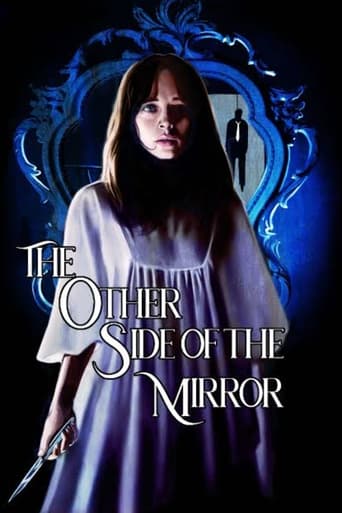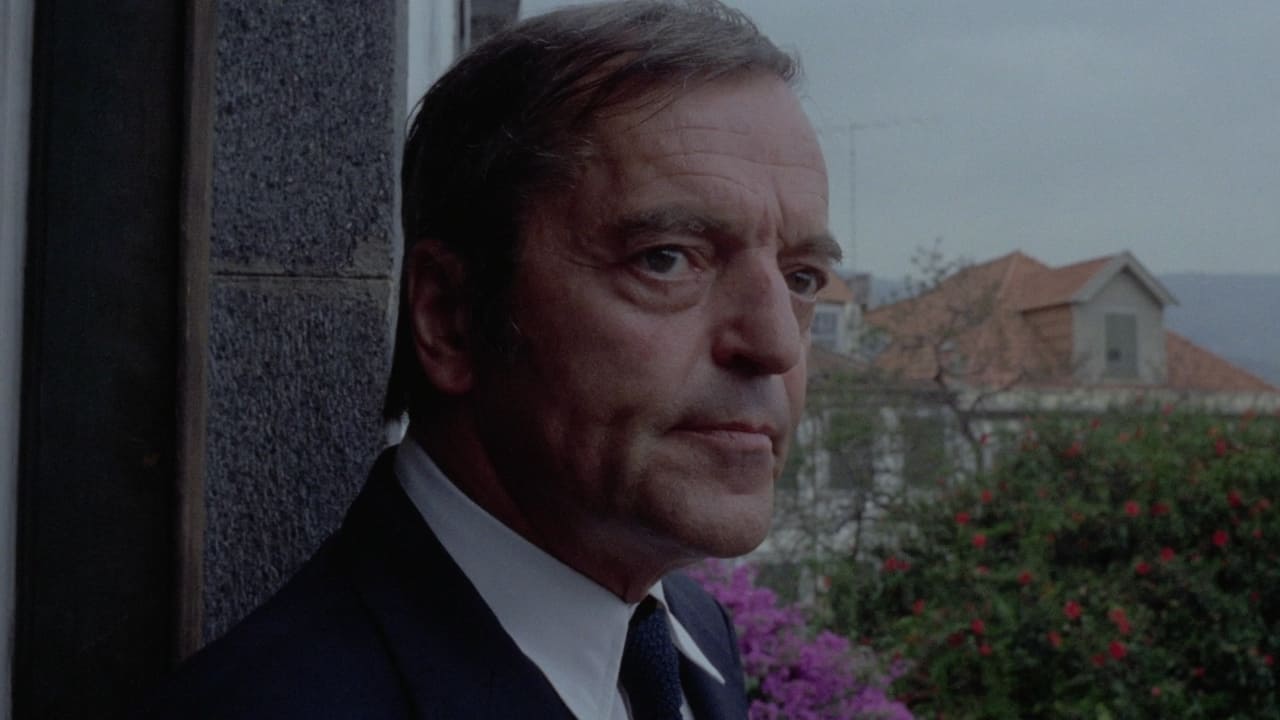Nigel P
As this is a Jess Franco film, it isn't surprising to learn that there are at least three versions. French, Spanish and Italian. In the Spanish version, the always excellent Howard Vernon plays Ana's father, and it is his spirit that leers through the mirror. In the French version, Vernon all but disappears and scenes featuring Lina Romay replace Vernon's death throes, and it is her spirit – that of Ana's sister Marie – that causes all kinds of hallucinogenic problems.Ana Cohen is played by wonderful Spanish starlet Emma Cohen. A musician and singer, Ana provides an innocent presence, which is a rarity in a film at this stage of Franco's career. This makes her descent into that of a mindless killer more pronounced.Of the two variants I have seen, I prefer the Spanish 'director's cut' version. It undoubtedly flows better, and we get a much sharper sense of horror with Vernon's suicide (complete with bulging eyes and protruding tongue) and his subsequent calling to her, seemingly from beyond the mirror. I can understand Franco's decision to replace this with images of Romay (I wonder how Vernon felt about this?): firstly, his fascination with her (which is understandable), and secondly as a means to attract more exploitative interest (which is useful – although Romay's scenes aren't restricted to titillation; they are fairly graphic and intrusive). And yet Romay, wonderful though she is, provides a distraction away from the story and although her scenes are inserted with smoothness, she nevertheless exists on the periphery, so we don't feel the sense of closeness between her and Ana like we do with Vernon.All that aside, this is quite a haunting piece of work, occasionally poetic by Franco's standards, although afflicted with his heavily meandering directorial style at times. The rolling gardens and spacious rooms offer us a chance to buy into Ana's serene surroundings and upbringing, whilst her scenes in a jazz band could have done with a lot of pruning.The inevitable smashing of the mirror is far more interesting in the Spanish version seeing, as we do, the final image of a hanged Vernon caressing his naked daughter, followed by the inexorable splintering of glass. In the French version, of course, Vernon's character never hung himself and therefore the climactic scene had to be shorn of 80% of its impact.The Obscene Mirror then: difficult to find, sometimes heavy-handed in its direction and overlong in places, but beautifully acted (especially the baleful Cohen) and rather haunting.
melvelvit-1
Ana (Emma Cohen) and her father (Howard Vernon) have always meant the world to each other but their idyllic life together shatters when the girl wants to get married and, going into his study to show him her wedding gown, she finds her dad dangling from the end of a rope. Devastated, Ana puts her piano skills to good use by running away to become a singer in a lounge band only to find the pain's inside. She's a beauty and men are interested but whenever Ana reciprocates, the image of her father's suicide appears to her in mirrors and she sees herself stabbing those men to death. Unfortunately, whenever that happens, she either hears or reads in the paper that the men really were murdered. Devastated again, Ana tries to commit suicide but her best friend intervenes and takes her to a beautiful island to rest and recuperate - the island where Ana and her father lived... The Spanish version of this film is considered to be the "director's cut" and I don't know how personal the film was to Franco but I took it personally. There's a fairytale quality to this adult nightmare about guilt and the burdens of the past we all carry but since it sounds like an oxymoron to put "expertly realized" and Jess Franco in the same sentence, suffice it to say that THE OBSCENE MIRROR was downright hypnotic. So much so, I didn't mind the time it took to get where it was going -and it certainly took its time. There were too many non-essential musical interludes and the camera's meaningless meandering makes Franco the most frustrating director I've ever encountered. All the zoom-in, zoom-out, pan right, scan left would be OK if it meant something but doing that to a flower bed or a harbor? Not only that, he'd go in for a close-up on a patron in a nightclub audience and linger so long I felt the person was bound to become part of the story but, no, they were just extras. Credit must go not only to the screenplay but to the cinematographer because there were long stretches where the film didn't seem like it was being "directed" and was quite beautiful to contemplate. All I can say in defense of my 8/10 rating is "there's something about it".
johnbernhard
As most know, there are 3 versions of the film. The Spanish is considered to be the true director's cut. The French changes the plot and swaps actors, while an Italian print adds hardcore bits to the newly added sex scenes from the French version. While it is frequently cited that the material in the French and Italian films were shot later, this is not entirely true. The Lina Romay footage was lensed later, but there are 3 extended nude scenes with Emma Cohen that were from the initial shoot, and I believe Franco would want them in any 'director's cut' DVD that will hopefully appear. They can easily be edited back into the Spanish print ( I've made myself a copy for future viewings ). Are the nude scenes essential to the plot, well perhaps not. But knowing how Franco adores the female form, coupled with Cohen's beautiful presence....I'd strongly feel he wanted them in the Spanish cut but was prevented by the strict censorship of the Spain at the time.
matheusmarchetti
I've only seen about 15 Jess Franco films so far, which is actually saying very little considering the countless amount of films he made, and in spite of the beyond-awful conditions the print I watched had, "Al Otro Lado del Espejo" (which translates to English as "The Other Side of the Mirror") still managed to make a impression on me, and might as well be the finest Franco film I've seen so far. Coming straight after Soledad Miranda's death, and not unlike the interesting but deeply flawed "A Virgin Among the Living Dead", this one is a haunting, beautiful study on death and grief, that "mirrors" Franco's own emotional breakdown after the death of his muse. The story stars Emma Cohen as Anna - a young bride-to-be who suffers a breakdown after her father (Franco-regular Howard Vernon) commits suicide on the eve of her wedding. She then starts having visions of her father through mirrors, beckoning her, and soon enough, goes on a killing spree against the men who sexually arouse her. The script is very cleverly written, with well developed characters that you actually care for, as well as being filled with Greek-mythology symbolism and Freudian motifs. Franco also benefits largely from having one of the best actresses he ever worked with playing the lead role. Cohen has that same innocents, doe-eyed beauty of Jessica Harper in "Suspiria", and gives one harrowing, psychotic and ultimately hearth-breaking performance as our grieving protagonist. The music, as usual for a Franco film, has great importance within the context of the film (since Anna is a nightclub singer who often "escapes" from her hectic life by entering into a "purely musical" state of mind), and composer Adolfo Waitzman (who also scored the same year's "A Bell from Hell" and the underrated "Pensione Paura") just nails it with a wonderful jazzy score. Another great aspect of the film is that this is probably the first Franco film that was actually creeped me out, and predates "Candyman" for almost 30 as far as "making mirrors scary as Hell" is concerned. Although the version I saw of this film was in a terrible state and was actually hard to watch at times, the cinematography appeared to be quite good, thus making it even sadder that it isn't available in a remastered, polished DVD. Speaking of which, the film is only available (this cut, at least) in Spanish with no subtitles, but since this is a very visual film (and if you know the main plot beforehand), it's not hard to figure out what's going on. The major problem with this film is that it starts quite well, but looses steam in between the end of the second act and beginning of the third, as Franco seemingly forgets he is a doing a horror film and just throws a series of non-stop, dull "jam sessions" that, though somewhat relevant to the plot, go on for a bit too long, ruining the oppressive atmosphere it had been building for so long. Thankfully, the film gets it's steam back at the ending, which remains the most powerful, twisted and just plain haunting I've seen in a Franco film. Overall, a brilliant gem of Spanish horror film that, though not for everyone, is essential viewing for fans of Eurohorror and Jess Franco alike. 9/10 Be aware, however, that the film is available in three different versions. The original Spanish cut, which is the version I've seen and the one Franco prefers; the soft-core French version which replaces Howard Vernon for Lina Romay as Anna's dead nymphomaniac sister; and the hardcore Italian version that adds even more sex and sleaze to the French version. The last two versions, though I've never actually seen them, seemingly does to the film what "House of Exorcism" did to "Lisa and the Devil", totally butchering what the director was aiming for, and should be avoided unless you're a hardcore Franco fan.


 AD
AD



